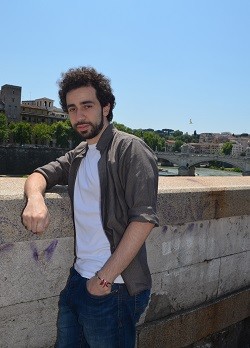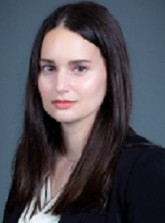Recent graduates on the job market
Justin K. Canfil
Justin K. Canfil earned a Ph.D. in political science with a minor specialization in law, including courses taken at Columbia Law School. His research examines the law and politics of emerging technologies, with a particular interest in international security, US-China relations, and cyberspace. He holds concurrent postdoctoral appointments with the Harvard Belfer Center's International Security Program, the Harvard-Columbia China and the World Program, and the Tufts Cybersecurity Program at the Fletcher School of Law and Diplomacy.
His book manuscript, titled System Shocks: Emerging Technologies, International Law, and the Politics of Contestation, explores the complex relationship between technological change, sovereign legal policy, and the resilience of international law and arms control regimes. Drawing from extensive archival research, formally-motivated experiments, fieldwork in Europe, Russia, and China, and an original dataset, it asks why some militarily impactful technologies are considered more legally problematic than others, and explains how states manage these emergent controversies in times of rapid change.
Dr. Canfil's work on the theme of emerging technology has been supported by the National Science Foundation, a Fulbright Scholarship, the U.S. Departments of State (Title VIII) and Education (FLAS), and other sources. As a Ph.D. student, he was previously affiliated with Harvard's Cyber Project, the London School of Economics, the Wilson Center, the University of Southern California's US-Asia Grand Strategy Program, Peking University, Fudan University, and Oxford.
For CV and contact information, please visit www.jcanfil.com

Ahmed Ezzeldin Mohamed
Ahmed Ezzeldin Mohamed holds a Ph.D. in political science (comparative politics) from Columbia University, with a minor in political methodology. He is a postdoctoral fellow at the Center for Democracy, Development, and Rule of Law (CDDRL) at Stanford University during the academic year 2022-2023. Dr. Mohamed is also a junior fellow of the Association for Analytic Learning about Islam and Muslim Societies (AALIMS). During the academic year 2021-2022, he was a research fellow at the Middle East Initiative at the Harvard Kennedy School's Belfer Center. Dr. Mohamed's research received several awards including: the Kellog/Notre Dame award for best paper in comparative politics at MPSA 2019, APSA 2020 politics and history section’s award for best paper, and APSA 2020 European Politics and Society section’s award for best paper.
Dr. Mohamed's primary research focuses on the role of religion in political and economic development, with a special focus on the Middle East and the Muslim World. His book project examines how religious norms influence public opinion, distributive politics, and government responsiveness in the Muslim World. The project tackles the question of how government responsiveness and accountability can be attained in non-democratic settings, focusing on the role of cultural and religious institutions as constraints on incumbents in contexts where electoral institutions might fail to hold governments accountable to their constituents.
His other research projects investigate the economic roots of religious voting cleavages in consolidated democracies, the long-term political effects of religious violence, the politics of religious schooling in the MENA region, electoral violence in autocracies, and the effects of conspiracy theories on political behavior. Dr. Mohamed uses a diverse set of tools for data collection and analysis such as web-scraping, machine learning, text analysis, causal inference, experiments, survey design and analysis, historical analysis, and fieldwork. He also enjoys teaching political methodology, research design, and comparative politics.
For more information about Dr. Mohamed's work and interests, please visit his personal website: www.aezzeldinmohamed.com
Michael Rubin
Michael Rubin is a Postdoctoral Scholar in the Center for Peace and Security Studies (cPASS) at the University of California, San Diego (UCSD). He earned a Ph.D. (2018) in political science from Columbia University, specializing in International Relations and Comparative Politics.
Dr. Rubin's research investigates the causes, conduct, and consequences of political conflict and violence. The research agenda explores three related research themes. The first examines belligerent conduct and civilian agency during civil war. Under what conditions do rebel groups seize and maintain territorial control, and what explains the decline of rebel control? Under what conditions do rebels provide governance to, and perpetrate violence against, civilians? How do civilians influence conflict processes? The second examines the causes and consequences of terrorism. Under what conditions do dissident groups resort to terrorism, and what are the consequences for conflict resolution and political stability? The third examines statebuilding and interstate conflict in the 21st century. Under what conditions do states employ “gray zone” conflict strategies, and under what conditions do these strategies escalate to direct militarized conflict? Under what conditions do new sovereign states emerge, existing states collapse, and specific political entities capture the state apparatus over others? In addition to explaining political violence and its consequences, this research agenda contributes to understanding state formation and its failures, the nature of extra-institutional political competition between and within states, and the strengths and limitations of state-centric models of the international system.
Dr. Rubin's research has been published or is forthcoming in International Studies Quarterly and the Journal of Conflict Resolution and has been funded by the National Science Foundation (Law and Social Sciences Program), The Earth Institute, the Weatherhead East Asian Institute, and the Center for Israel Education. Dr. Rubin has conducted field research in the Philippines and has worked on dataset design and collection for the Terrorism in Armed Conflict (TAC) and Named Entities for Social Sciences (NESS) projects. For more information and links to published and ongoing work, please visit his website: www.michaelarubin.com

Laura Resnick Samotin
Laura Resnick Samotin is the post-doctoral fellow in national security and intelligence at the Saltzman Institute of War and Peace Studies, Columbia University. She obtained a Ph.D. in political science at Columbia University, where she focused on the non-material determinants of military effectiveness. Her dissertation examined how militarism contributes to a reduction in military effectiveness and adverse war outcomes via the generation of disintegrated wartime grand strategy. In addition to her work on intelligence and grand strategy, she conducts research on political psychology, specifically on bias in decision-making processes; on American foreign policy; and on military technological innovation.
Dr. Resnick Samotin was a Cordier Fellow in the School of International and Public Affairs at Columbia from 2016 to 2021. She was awarded a pre-doctoral fellowship at the Schwarzenegger Institute at the University of Southern California in Fall 2018 and a Hans Morgenthau pre-doctoral fellowship at the University of Notre Dame in Spring 2020. Her work has been funded by the George H.W. Bush Presidential Library’s Scowcroft O’Donnell Grant and a Charles Koch Foundation dissertation development grant for the study of grand strategy.
Before starting her Ph.D., she was a researcher at The Good Judgement Project at the University of Pennsylvania. She holds a B.A. in political science from the University of Pennsylvania and an M.A. and M.Phil. from Columbia University.